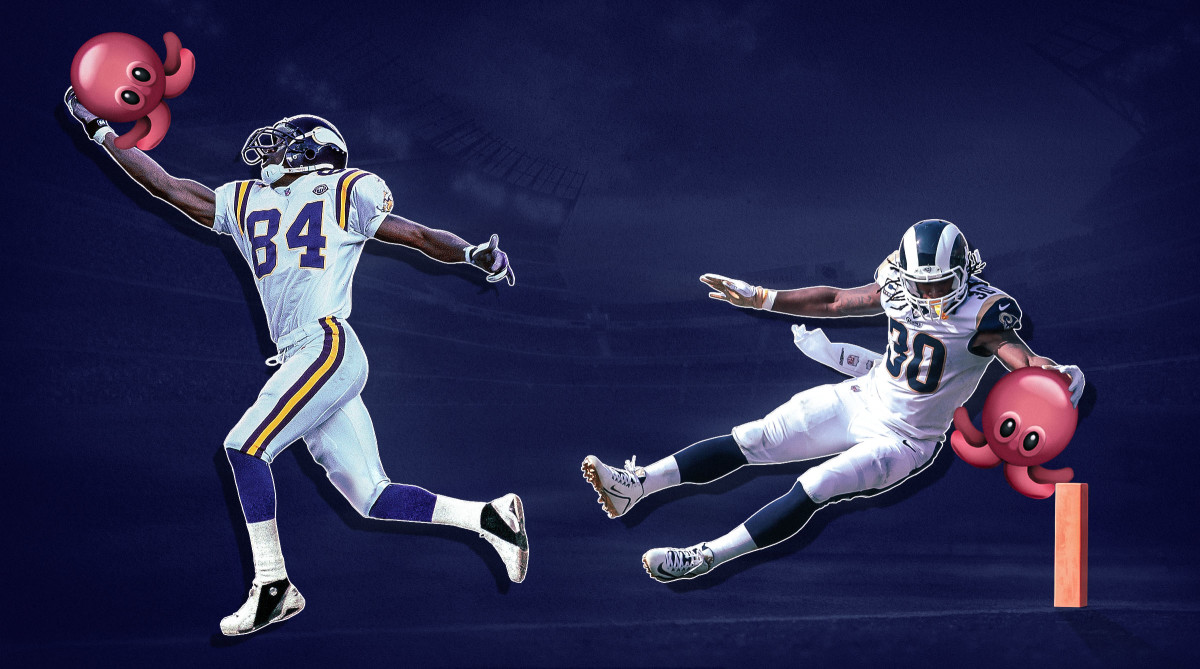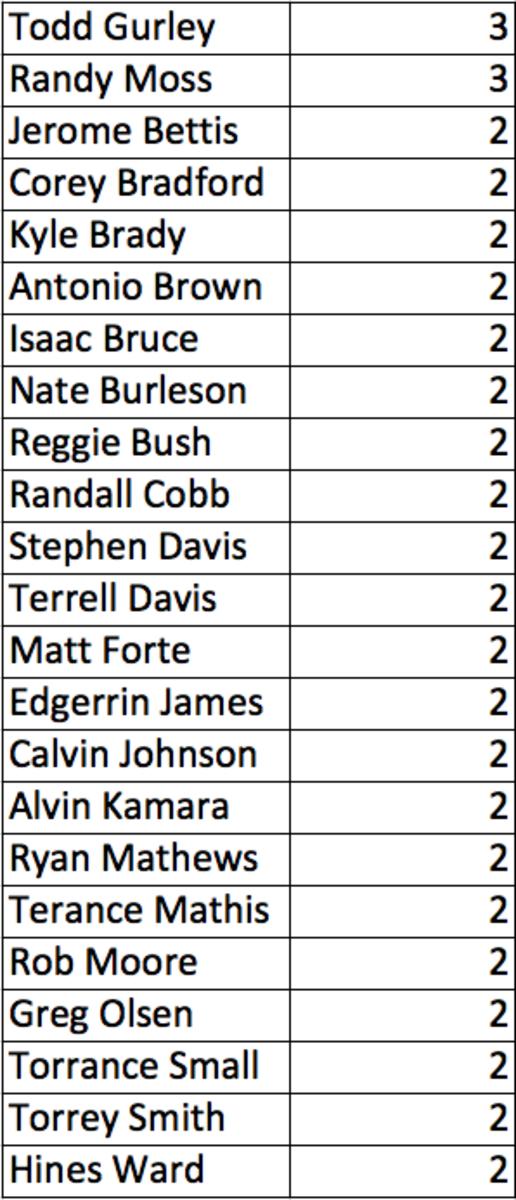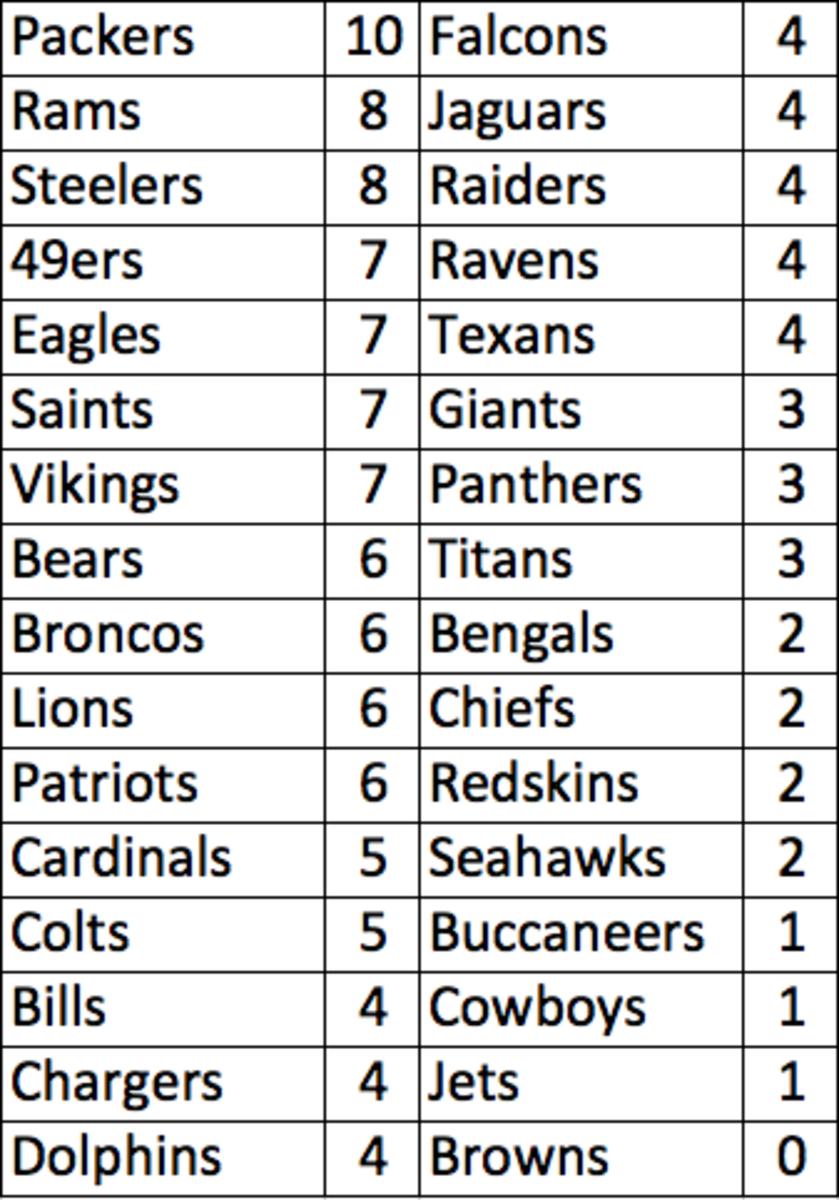Introducing: The Octopus, Our Favorite Type of Two-Point Conversion

Twenty-five years ago this week, the NFL made a momentous decision that has altered the potential outcome of every NFL scoreboard since. The biggest headline the day owners met in Orlando on March 22, 1994, was the addition of new franchises in Carolina and Jacksonville. But as far as the actual play on the field, few decisions have mattered as much as the adoption of the two-point conversion.
College football already offered the two-point conversion after touchdowns at the time, the old AFL had the two-pointer in place throughout its 10-year history, and the NFL even adopted a modified version for the first season after the leagues merged. But 25 years ago, the NFL approved the two-point conversion as we know it and never looked back. While slight tweaks have been made since—the defense can now get two points of its own if it returns a fumble or an interception back the other way on a two-point attempt; and it’s even possible to score a one-point safety, thanks to an obscure rule that has not yet come into play—but the scoring has pretty much been standardized since 1994. Touchdowns, field goals, extra points, safeties and two-point conversions (offense or defense) are the only methods by which teams have put points on an NFL scoreboard.
So happy round-number anniversary. That’s the “news hook” which I’m told is a thing you should have when you write on the internet. The real reason I’m typing today is because I’ve always wanted to coin something. But, like a coach up by two points with a chance to extend the lead to four, I’ve just never had the courage to try. (Note: Actually Mike Tomlin did that once.)
My love of box scores, obscure stats and useless trivia has led me here. As I look back on the last 25 years of the two-point conversion—a wonderful innovation by all accounts—I offer you a new entry for the NFL lexicon.
Behold: The octopus.
Thanks to the amazing database (and helpful researchers) at Pro Football Reference, we know that there have been 988 successful two-point conversions in the last 25 years. On 140 of those occasions—about 14.2 percent—the conversion was scored by the same player who scored the touchdown. I am counting the person who is actually credited with the points scored—meaning Aaron Rodgers gets credit for an octopus thanks to his rushing touchdown and subsequent rushing conversion in Green Bay’s frantic overtime win against the Jets in Week 16 last season, but he would not get credit for one had either of those Packers trips to the end zone been a result of him passing the ball to somebody else.
Eight points scored … an octopus … you get it.
I threw the idea out on Twitter after Torrey Smith recorded an octopus in October:
There should be a cool name for what Torrey Smith just did: Scoring a TD and then also scoring the 2-point conversion right afterward.
— Mitch Goldich 🐙 (@mitchgoldich) October 14, 2018
What should we call this?
And the answer came immediately from my friend Mike Wallace (shout out to my punters-only fantasy football league, of which Wallace is a two-time champion). With his blessing, I share this term with the world.
So on this day of celebrating two points, what precisely is my point? Naturally, it’s to find out who is the king of this stat nobody ever knew they were accumulating. Let us dive into the 140 octopi on record and see where the tentacles lead us.
Some octopus facts: Rob Moore and Torrence Small scored the first two octopi, on the same day in 1994. Moore and Terance Mathis became the first to accomplish the feat twice in a career, on the same day in 1996. Ryan Mathews was the first to do it twice in one season, in 2016.
While those names might not otherwise be remembered 50 years from now, the list of 23 players who have recorded multiple octopi in their career is actually a star-studded collection of greats from the last quarter-century. There are Hall of Famers like Jerome Bettis and Terrell Davis (whose pair of octopi includes the first one in the postseason); stars like Calvin Johnson, Isaac Bruce, Edgerrin James and Hines Ward; Pro Bowlers like Randall Cobb, Greg Olsen and Matt Forte; and active stars Antonio Brown and Alvin Kamara.
Some octopi are more legendary than others. There have been 19 instances where a team was down 8 and then an octopus tied the score. And three times a team has been down 7 and then an octopus gave them the lead: Eddie Royal for the Broncos in 2008, Ryan Mathews for the Eagles in 2016, and—quite memorably—Mike Williams with just four seconds left in the Chargers’ dramatic 29-28 win over the Chiefs in Week 15 last year.
The obvious question you’re asking yourself now, because suddenly you can’t believe you’ve lived so long without knowing this fact, is who has the most in their career. Two players are tied with three each, and it’s quite the pair: Randy Moss and Todd Gurley.
Moss recorded octopi in 1998 and 2000 with the Vikings, and threw in a record third in 2009 with the Patriots.
In Week 2 this year against the Cardinals, the game when Johnny Hekker had to kick field goals for the Rams because Greg Zuerlein injured himself in pregame warmups, Gurley became the first to do it twice in a single game. When he added another in Week 8 against the Packers, Gurley became the first player ever with three octopi in one season. (Sadly this won't be the most memorable part of his season.)
With the proliferation of two-point conversions in recent years, especially in an environment in which some teams in particular are growing more aggressive, we may see more players climb to the top of the octopus leaderboard. In fact, 2018 saw a record 15 octopi, paced by Gurley’s trio.
Until about three weeks before the Super Bowl, it felt like a sure thing that Gurley would surpass Randy Moss’s mark. He still has as good a shot as anyone to ascend the throne, though Brown and Kamara are leading contenders to beat him there. But one thing is for sure: It’s only a matter of time before someone separates himself from the pack and becomes our official Octopus King.
Because that’s what we all call it now.
For those curious, here's the full list of every NFL octopus, sorted by date. Below that I've included the all-time leaderboard with any player who has more than one, followed by the total octopi for each team:
All-time career individual leaders:

Team-by-team octopus leaders:

Who will join the list this year? We'll definitely keep an eye out. And of course let me know if you spot one.
• Question or comment? Email us at .
Read more on the Super Bowl
manual
